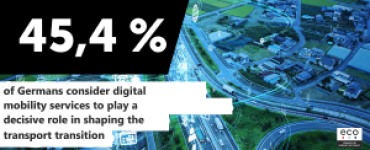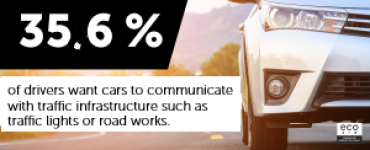eco Chair of the Board Süme: “Strengthening people’s trust in transparent data use”
- 87.5 per cent of Germans are not yet using smart mobility services
- 60.8 per cent of respondents reject the release of their mobility data
- Younger generation more open to shared mobility services
- eco study confirms climate protection potential of shared mobility
- Climate protection benefits (9.4 per cent) and monetary savings potential (8.6 per cent) are the strongest incentives for sharing data
The mobility of the future is digital, connected and available on demand. The future mobility ecosystem is based on digital platforms that offer mobility as a service to users across all modes of transport. The centralised service and data platforms use artificial intelligence to determine the most convenient and efficient route. Traffic flows can thus be optimally controlled and contribute to a considerable relief of the environment, resources and transport infrastructures – that is the vision for the future.
At present, however, the use of the new mobility services is still rather low. 87.5 per cent of people in Germany are not currently using any smart shared mobility services. This is a finding of a survey conducted by eco – Association of the Internet Industry in cooperation with the market and opinion research institute Civey*, in which 2,500 people from Germany participated at the beginning of September. One reason for this reluctance could be the still widespread scepticism, especially in Germany, in connection with the use of personal data. According to the survey, over 60 per cent of respondents currently decline to share their mobility data with providers.
“For a sustainable mobility transition, a mobility ecosystem is needed that enables the sovereign and secure exchange of data among all actors involved. This is the only way providers can establish connected platforms that take real-time data into account to determine the best-suited means of transport and the most efficient route. Equally imperative are high-performance digital infrastructures for data processing and the trust and participation of citizens,” emphasises Oliver Süme, Chair of the Board of the eco Association. Sustainable and innovation-driven progress in the mobility sector is almost impossible without meaningful data and its availability and networking. The German “Mobilithek” platform, the Mobility Data Space and the new Mobility Data Ordinance of the Federal Ministry of Digital Affairs and Transport (BMDV) together represent the first step in the right direction to create mobility platforms that optimally manage traffic flows on the basis of data – for example, on capacity utilisation and availability – and to provide appropriate solutions to increasing urbanisation, climate change, the sustainable use of resources and changing mobility needs. As Süme goes on to say, such a regulatory framework is also an important prerequisite for strengthening the trust of users in smart mobility services and creating acceptance for the transparent use of data generated there.
Younger generation is more open to shared mobility
The usage rates of various forms of new mobility services range between 3.5 per cent (driving services) and 0.6 per cent (ride-sharing services) across all age groups. Overall, 3.5 per cent of respondents currently use ride services such as Uber, but among the under-30s, the figure is more than four times higher (15.2 per cent). Among 30-39 year-olds, bike-sharing services (15.6 per cent) are the most popular, followed by car-sharing services (10.2 per cent). “The traffic turnaround away from individual transport and ownership towards shared mobility services also requires a change in attitude at the individual level,” Süme explains. This change is already more advanced in the younger generation and reflects the changed usage needs in the mobility sector.
With regard to the selection of a shared mobility service, the price (14.2 per cent) is the most decisive factor for the respondents, followed by the ease of use of the app (11.8 per cent) and the security of personal data (10.6 per cent). The factors should be taken into account when developing innovative smart services in the mobility sector.
Users are critical of data sharing
The greatest asset of the mobility ecosystem of the future is data generated by the interconnection of digital services. However, more than 60 per cent of respondents are not willing to share their data with mobility providers, even if it results in personal or community benefits. 9.4 per cent would disclose their mobility data if it were associated with a benefit for climate protection. 8.6 per cent of respondents have a positive view on data sharing if it saves them money. In addition to setting up data spaces, incentives and drivers such as climate protection and cost savings benefits should therefore also be the focus of communication in order to increase the acceptance and willingness of users to share data with the actors involved while complying with legal framework conditions. So far, the willingness to share data is particularly high only among students: 65.1 per cent are willing to make their data available to mobility service providers without attaching conditions to it.
The immense potential of shared mobility concepts in the area of climate protection is illustrated by the study “The Smart City Market in Germany, 2021-2026” by Arthur D. Little on behalf of eco. By optimising traffic flows in urban car traffic alone, up to 50 per cent of CO2 emissions can be saved by 2030 through connected mobility. Optimised traffic flows help to prevent congestion and the search for parking spaces, thereby also reducing fuel consumption.
*The opinion research company Civey surveyed 2,500 people between 8 and 9 September 2022 on behalf of eco Association. The results are representative of the inhabitants of the FRG aged 18 and over. The statistical error of the overall results is 3.6 per cent.




